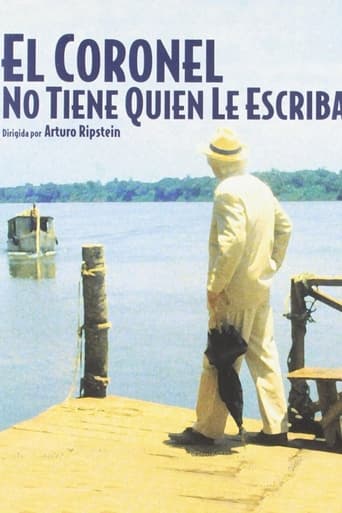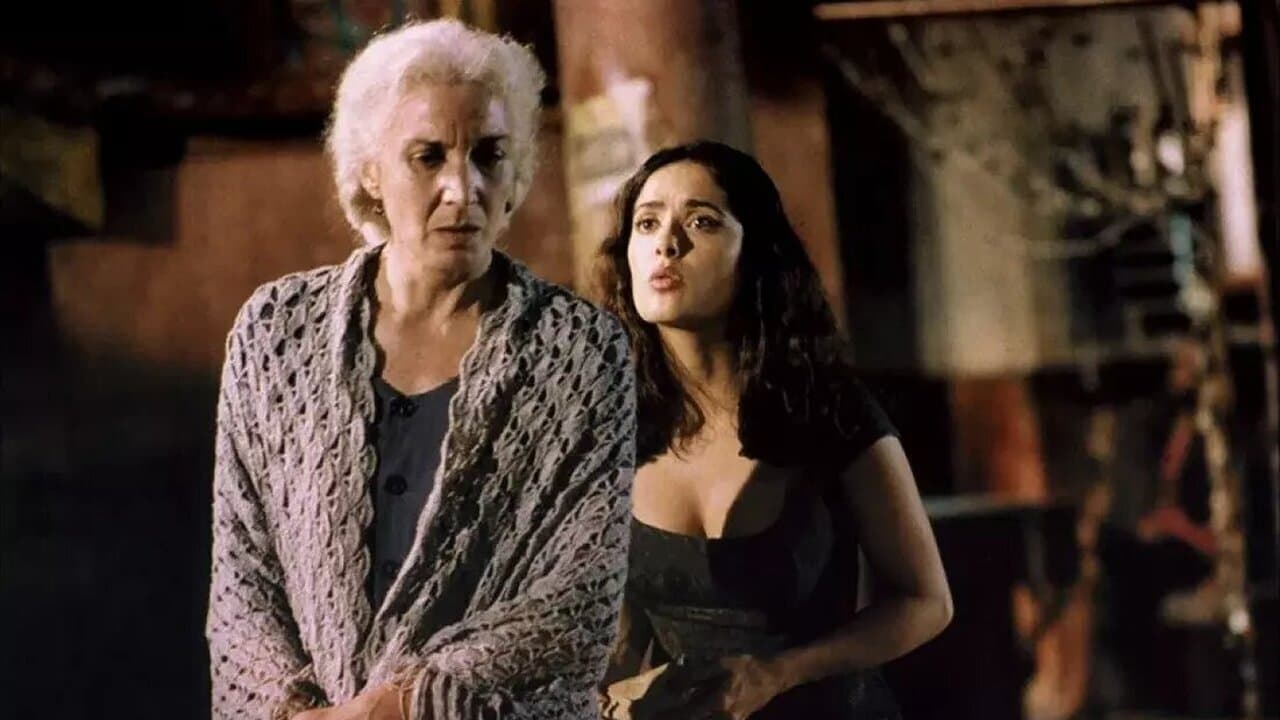hoapo
I can not agree with the review that brands this movie as a pretentious piece. Nevertheless I'm not absolutely positive about it. I think that you shouldn't miss it if you haven't read the book. The movie has very rare virtues - probably thanks to the genius of Ripstein -: the aforementioned cinematography is stunning (the shots on the riverside, the interior of the Colonel's house, etc.), the slow pace helps to create a unique atmosphere which is very suited to the subjects.Said this, I have quite a few objections, too: 1) Some allusions place the plot in a Mexican context, which is far away from the original one. 2) A lot of symbols from the novel (where almost everything has a symbolic value - thanks to the genius of Márquez): a) The apprehension of the wife for the rooster and for the Friday's mail with the pension extinguishes the very strong difference between husband and wife which is fundamental in the book; b) The introduction of the mortgage-theme marks a very single and unrepeated situation, although in the novel there is no such thing, the main point is the monotony of the status of the old couple. 3) In my view the wife (for example by going to the cinema and talking to the priest) has a less consistent character, but at the same time the political views of the Colonel and of the friends of his son are overly stressed. 4) The introduction of the lover's storyline weakens the tension (which is tried to be substituted with the mentioned political views' exposure) that proceeds of the reticence of the causes of the death of the son. 5) I may have forgotten some points for now, but, at last, if you speak Spanish and know something about its accents, the wife's talking will bother you a bit.I'm not saying at all that this is a bad piece, but having read the sublime book of Márquez, and as the movie is confessedly the cinematographic version of the novel (and in my opinion that takes away the complete separateness of the work of Ripstein), I can't help having these thoughts after watching it.
gonzo931
As many people know, Mexican cinema was very poor after the so-called Golden Age of the Mexican Cinema, fortunately, during the late 90's, and early 21st century, great movies like La Ley de Herodes, Bajo California, Amores Perros, Y Tu Mamá También and, of course, El Coronel No Tiene Quien le Escriba, appeared. El Coronel..., is a wonderful movie, that retells the classic story by Gabriel García Márquez, by eliminating the magic realism elements, and replacing them with the crude reality lived in Mexico, not only by people like the Colonel, who wait for their pensions, but by more than the half of the Mexican population, who live in complete poverty. The film's characters, satirically represent classic characters found in Mexican society, such as the nationalist Colonel, the cold and even ambitious priest, the hypocrite, but at the same time loyal compadre, the tolerant and patient wife, the hidden homosexual, etc. This movie, is a must-see if you want to know more about Mexican society, and specially, if you want to watch a gorgeous movie, by one of Mexico's finest directors
camel-9
a bit slow and boring, the tale of an old man and his wife living a delapidated building and interacting with a fixed cast of characters like the mailman, the brothers sitting on the porch, the wealthy cigar smoking man. The photography of the river is marvelous, as is the interior period decoration. If you like decoration of Banana Republic stores, this is a must.
Arnoldo Valdez
What is it about Marquez that his films have failed to capture the beauty, magic and wonder of his stories? It seems like the guy writes a script out of everything, even his laundry list. Of course the best thing he's ever written will probably never make it to the screen(One hundred years of Solitude). The only other film that's noteworthy was The Summer of Ms. Forbes. Until now. It was about time that a great auteur took a crack at a Marquez Story and Ripstein is the genius to do it.(Tiempo De Morir was okay, but he was 21 when he made it and not yet a great film maker. Ripstein has crafted a wonderful, moving, luscious story out of "No one writes to the Colonel", a story that I questioned could be made into an engaging film. (Here we go again, a town where nothing happens, it's always hot and time moves painfully slow) Of course it doesn't mean the film has to bore you to death, and Ripstein captures the elements mentioned above and still makes it compelling and captures the immense sadness and social injustice in the story. The music is compelling as well by the American composer Mansfield, of Heaven's Gate.


 AD
AD


